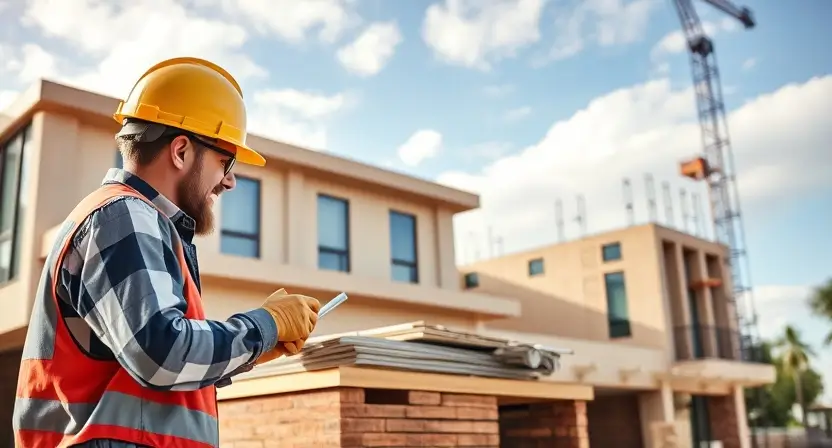Choosing the right general contractor for your project can make or break your renovation, construction, or remodeling endeavor. The decision requires careful research, as the contractor you select will be responsible for ensuring the project runs smoothly, stays on budget, and meets your expectations.

Here, we’ll walk you through a comprehensive guide on how to choose the best general contractor for your needs. Whether you’re managing a home remodel or a large-scale commercial project, these tips will help you make an informed decision.
1. Clarify Your Project Requirements
Before you even start looking for a contractor, it’s essential to have a clear understanding of your project’s scope, budget, and timeline. Outline the details, such as:
- The type of project (e.g., residential renovation, new construction, commercial space upgrade)
- The specific tasks involved
- The expected completion date
- Your budget constraints
- Specific materials or design preferences
This clarity will help you communicate your needs effectively when interviewing potential contractors. It will also set a solid foundation for accurate estimates and project timelines.
2. Do Your Research
Start with a broad search to gather a list of potential contractors in your area. Use industry-specific directories, such as SEO for General Contractors, local business listings, and referrals from friends and colleagues. Ensure you:
- Check their websites for experience and specialties
- Read online reviews on trusted platforms like Google, Yelp, and the Better Business Bureau
- Look for any industry certifications or memberships in professional associations
- Check their social media presence for recent projects and interactions with clients
In addition, attending local home improvement expos or trade shows can be a valuable way to meet contractors in person, discuss your project, and evaluate their professionalism.
3. Verify Licensing and Insurance
One of the most critical aspects of choosing a contractor is confirming that they are licensed and insured. A valid license demonstrates that they meet state or local requirements for construction work. Insurance, including general liability and workers’ compensation, protects you from potential legal and financial issues if accidents occur during the project.

Request copies of their license and insurance certificates, and verify their validity with the relevant state or local authorities. This step ensures that you’re protected from liability and working with a legitimate professional.
4. Assess Experience and Expertise
Experience matters when selecting a general contractor. Look for contractors who have completed similar projects to yours. For example:
- If you’re planning a home kitchen remodel, choose a contractor who has a portfolio of successful kitchen projects.
- For commercial projects, ensure they have experience with permits, regulations, and the complexities that commercial construction entails.
Don’t hesitate to ask potential contractors for references and examples of previous work. A reputable contractor should provide photos, client testimonials, and details of completed projects. Speaking directly with previous clients about their experiences can provide insight into the contractor’s reliability and craftsmanship.
5. Review Their Project Management Approach
A skilled contractor not only executes the construction work but also manages the project efficiently. When speaking to candidates, ask about:
- Their typical workflow
- How they handle unexpected challenges or changes
- How they communicate progress with clients
- The technology or project management tools they use
The answers should indicate whether they can handle your project’s complexity and keep you informed throughout the process. Contractors who utilize modern project management tools can provide better transparency and communication.
6. Request Detailed Estimates
Requesting a comprehensive written estimate from multiple contractors is a crucial step. Be wary of estimates that are significantly lower than others—this could be a sign of cutting corners or hidden fees. Your estimate should include:
- A breakdown of material costs
- Labor charges
- A timeline of payment schedules
- Possible contingency plans for unexpected expenses
Make sure each estimate details the quality and type of materials to be used. This level of specificity helps prevent misunderstandings about the final result and keeps your project on track.
7. Communication is Key
The contractor you choose should be someone who communicates clearly and regularly. They should be approachable and willing to discuss project details or answer questions. Ask about their preferred methods of communication (e.g., phone, email, in-person meetings) and ensure it aligns with your preferences.

Also, find out if the contractor assigns a dedicated project manager or if they will be your main point of contact. Clear communication ensures that issues are addressed promptly, and you remain updated on progress.
8. Check Contracts and Warranties
Before signing any agreement, review the contract thoroughly. A professional contract should outline:
- The scope of work
- Deadlines and milestones
- Payment terms
- Specific warranties for workmanship or materials
- Terms for handling changes to the project scope (change orders)
A solid warranty shows that the contractor stands by their work, giving you peace of mind in case issues arise post-completion. Ensure that the warranty period and conditions are clearly stated in the contract.
9. Review Their Safety Practices
Safety should be a priority for any contractor you choose. Inquire about their safety protocols and how they ensure a safe working environment. Contractors should adhere to OSHA standards and provide training to their workers. A strong safety record indicates a contractor who values their team’s well-being and minimizes the risk of accidents on your project site.
10. Trust Your Instincts
Finally, trust your instincts. If a contractor checks all the technical boxes but you feel uneasy about them, consider it a red flag. A successful project requires collaboration, so choose a contractor with whom you feel comfortable working.
Pay attention to how they respond to your questions and if they show genuine interest in your project. Contractors who are transparent, listen carefully, and answer confidently are more likely to be trustworthy partners.
Final Thoughts
Selecting the right general contractor for your project can take time, but it’s a worthwhile investment. By following these tips, you’ll be equipped to make a decision that leads to a smooth, efficient, and successful project.
Remember, it’s not just about choosing the most affordable option—it’s about finding a contractor who meets your project needs, aligns with your vision, and delivers quality results.
Explore more resources and connect with qualified contractors through SEO for General Contractors.
FAQ
Hiring an experienced contractor with a solid track record and maintaining open communication are key. Discuss potential delays upfront and ensure the contractor has a contingency plan. Learn more tips.
You can verify a contractor’s license through your state or local licensing board’s website. This ensures they meet the necessary legal and professional standards.
While price is important, it shouldn’t be the sole factor in your decision. The cheapest contractor may cut corners, while the most expensive one isn’t always the best. Look for value—consider experience, quality of work, and reputation alongside the cost.



Pingback: How to Ensure Your Construction Project Stays on Budget
Pingback: General Contractor vs. Subcontractor: What’s the Difference?